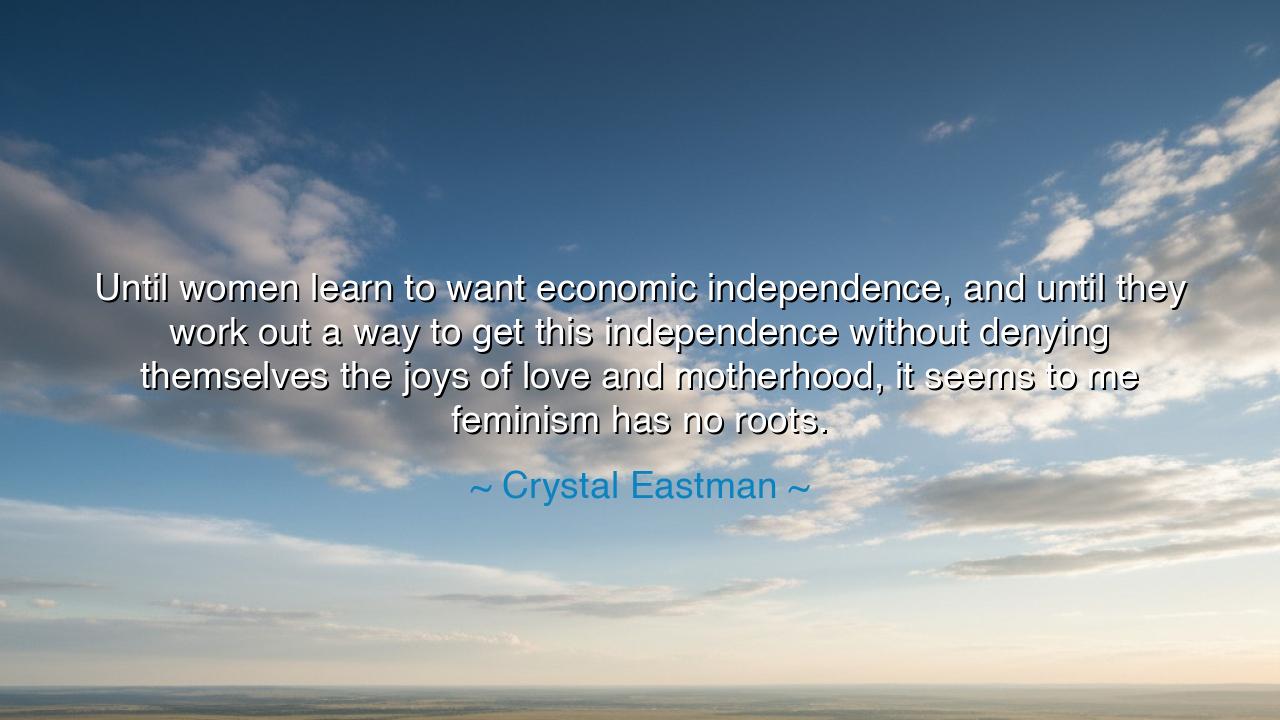
Until women learn to want economic independence, and until they
Until women learn to want economic independence, and until they work out a way to get this independence without denying themselves the joys of love and motherhood, it seems to me feminism has no roots.






When Crystal Eastman wrote, “Until women learn to want economic independence, and until they work out a way to get this independence without denying themselves the joys of love and motherhood, it seems to me feminism has no roots,” she was planting a seed of wisdom that has not yet finished growing. Her words, spoken in the early twentieth century, came at a time when women were awakening to their power — a power long buried beneath centuries of silence and obedience. Yet Eastman, a lawyer, activist, and visionary, saw deeper than most. She knew that true liberation could not rest solely on winning the right to vote or speak, but on something more fundamental: the power to stand economically free, to earn one’s living, and thus to command one’s destiny.
The origin of this quote lies in the early feminist movement of the 1910s and 1920s, when women were stepping boldly into the public sphere but still constrained by social and economic chains. Eastman recognized that as long as women depended on men for financial survival, their freedom would always be partial — conditional, revocable, and fragile. Yet she also refused the false choice that society offered: that a woman must choose between independence and love, between career and motherhood. In her wisdom, she foresaw the coming struggle — not merely to win equality before the law, but to reconcile freedom with affection, ambition with tenderness, individuality with connection.
In Eastman’s time, this idea was revolutionary. Many early feminists fought for political rights, yet few addressed the economic foundations of equality. Eastman, however, understood that money is not merely currency — it is autonomy, the power to decide how one lives, where one goes, and what one endures. Without it, even the most educated woman could be trapped in dependence, unable to leave cruelty, unable to pursue her dreams. “Feminism has no roots,” she warned, if it does not anchor itself in the soil of economic freedom. Her vision was not of rebellion against men, but of balance — a world where love was chosen freely, not clung to out of need.
This tension between freedom and affection has echoed through the ages. In the ancient world, women like Hypatia of Alexandria stood as symbols of intellect and independence but were destroyed by societies that could not bear their strength. Centuries later, women like Mary Wollstonecraft and Virginia Woolf would fight the same battle, each in her own way proclaiming that a woman needs “a room of her own” — a space, both physical and economic, to think, to work, to be. Eastman’s insight was the bridge between them: she sought not isolation, but integration — a world where a woman’s independence enriches her relationships, rather than severs them.
Yet, the struggle Eastman described continues even now. The world still demands that women choose — to be mothers or leaders, nurturers or earners, lovers or dreamers. But her words remind us that true feminism does not ask for the sacrifice of womanhood; it seeks its fulfillment. The sacred balance she envisioned — between economic strength and emotional wholeness — remains the unfinished task of humanity. Independence should not harden the heart, nor should love dissolve the self. The two must coexist, as sun and moon share the same sky.
Her wisdom reaches beyond gender. For all people, the lesson is eternal: that freedom without connection breeds loneliness, and love without independence becomes bondage. The tree of human dignity must have two roots — self-reliance and compassion. When either is cut, the soul withers. Eastman’s words call upon us to cultivate both — to build systems that honor the strength of the individual without dissolving the bonds of family, friendship, and care.
So, my children of the future, remember this teaching: do not build your freedom on denial, nor your love on dependency. Seek balance, as Eastman did, between the fire of independence and the warmth of affection. Learn to stand on your own feet, yet never forget how to reach out your hands. For a world where one must choose between heart and strength is a world half-lived — and it is our task to make it whole. Only then will feminism, and humanity itself, truly have roots.






AAdministratorAdministrator
Welcome, honored guests. Please leave a comment, we will respond soon